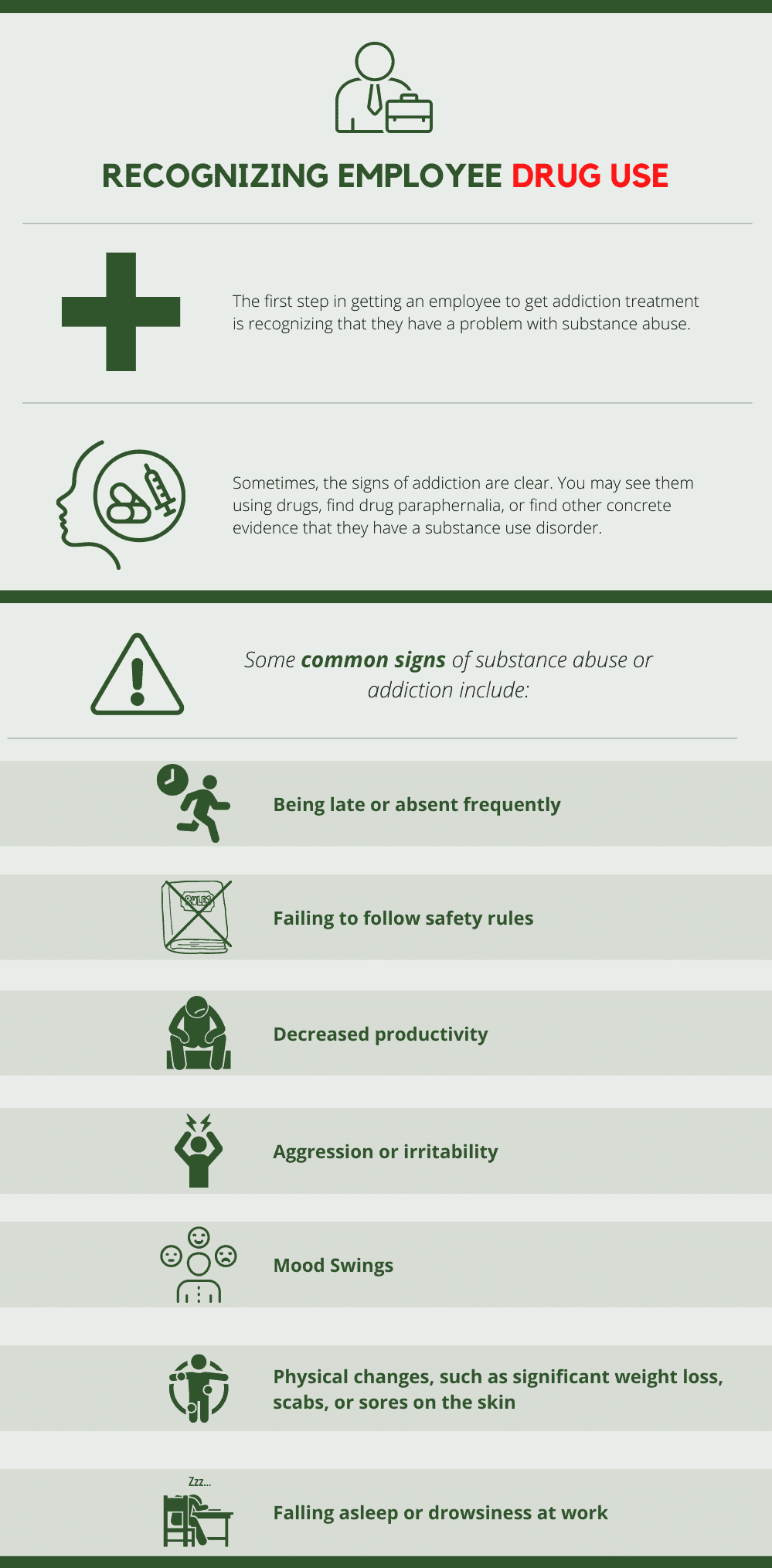For many people, work is not simply about the paycheck–your team becomes like an extended family. When a coworker or employee shows signs that they are struggling with addiction, everyone feels it. Addiction does not only affect the person living with it. The effects of an employee’s drug use or addiction reach everyone around them, from fellow employees to customers.
People who live with addiction can suffer long-lasting damage to their physical and mental health. They are also more likely to be involved in a workplace accident, be violent or aggressive, and cause injuries in the workplace. People who abuse substances at work are more likely to be absent or late and have low productivity.[1,2] This results in other employees having to work harder. In general, substance abuse in the workplace can lead to unsafe working conditions and often leads to high rates of turnover.
The vast majority of people who seek treatment for substance abuse and addiction are employed. If you manage a company or are responsible for employees, you must understand how to approach an employee about drug use and how to help an addicted employee.

Recognizing Employee Drug Use
The first step in getting an employee to get addiction treatment is recognizing that they have a problem with substance abuse. Sometimes, the signs of addiction are clear. You may see them using drugs, find drug paraphernalia, or find other concrete evidence that they have a substance use disorder.
However, in many cases, you may have to observe and record their behavior to feel certain that substance abuse is the issue at hand. Some common signs of substance abuse or addiction include:
- Being late or absent frequently
- Failing to follow safety rules
- Decreased productivity
- Aggression or irritability
- Mood swings
- Physical changes, such as significant weight loss, scabs, or sores on the skin
- Falling asleep or drowsiness at work
Once you have determined that your employee is struggling with substance abuse, you can make a plan to help them get the treatment they need.

Get The Care You Need and Deserve
Woburn Addiction Treatment is a leader in the addiction treatment field, with proven success in facilitating long-term recovery. Our team of top clinical & medical experts specializes in treating addiction coupled with mental illness, ensuring that each person receives individualized care. Call us – we’re available 24/day, 7 days/week.
Staging a Workplace Intervention
An intervention at work will be different than an intervention for a loved one. First, you must understand and work within the corporate guidelines for addressing substance abuse in the workplace.
Generally, when you stage a workplace intervention, you can take the following steps:
- Check your workplace policy – Many companies have a corporate drug testing policy. Do some research about it and see if you can ask an employee to take a drug test.
- Observe – Pay attention to your employee’s behavior at work, how often they are late or absent, and their interactions with other employees or customers.
- Document – You may be required to show a record of your employee’s actions before taking any further steps, so make sure you are recording your observations. Write down what you see and ask other managers to do the same.
- Intervention – If appropriate and allowed by your company policy, you can hold a workplace intervention for your employee. During an intervention, people bring attention to the employee’s behavior and the concerns about their substance abuse. An intervention should include the employee and at least two other people.
- Follow-through – The next steps may include termination or assistance finding an appropriate substance abuse treatment program. Since each company has its own policy, the next steps will be determined by the limitations and responsibilities of the company, as well as the employee’s willingness to get treatment.
Approaching an Employee About Their Drug Use
The process you use to help an addicted employee might be very different than what you might do for a friend or family member. Because you are working in a professional setting with your employee, you will have to check with your human resources department about what steps you can legally take. Generally, you will want to take some steps to protect yourself as an employer, while encouraging the employee to get into a treatment program.
- Choose an appropriate place and time
- Decide who will be present–usually, a representative from Human Resources and the employee’s manager
- Decide ahead of time who will speak, and in what order
- Refer to your corporate policy about appropriate next steps, including finding an appropriate addiction treatment program to offer
- Hold the intervention
- Follow through with stated consequences
Focus on your concern about their drug use and your desire to see them get the help they need. While addressing employee drug use might feel uncomfortable, it is an important part of keeping your work-family safe and your business running smoothly.
Find Support for An Employee’s Drug or Alcohol Use
If you have concerns about a loved one or employee’s substance use, reach out to the staff at Woburn Addiction Treatment. We offer a range of addiction treatment programs in Massachusetts designed to give people the support they need during recovery from addiction. Our staff is ready to answer your questions and help you make a plan if needed. We support people at every stage of addiction and recovery. Don’t wait another day for the life-saving treatment you need. Call today to speak with one of our admissions counselors.
References:


